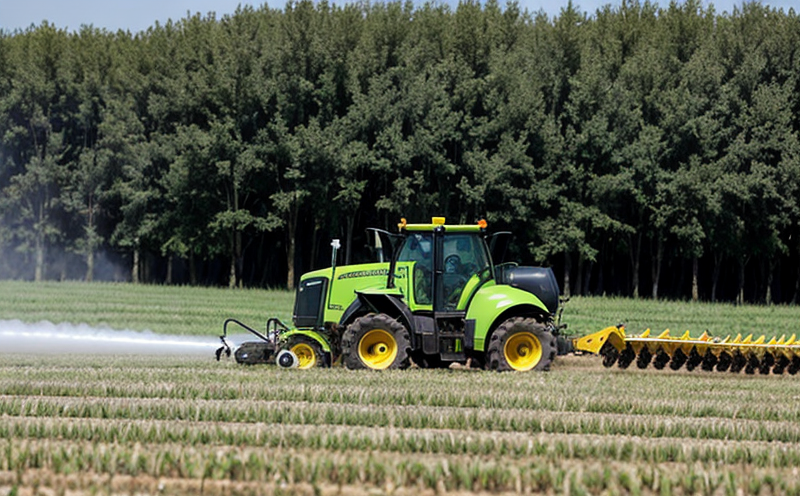Paraquat Residue Testing in Crops Validation Method Development Test
The testing of paraquat residues in crops is crucial to ensure food safety and environmental sustainability. Paraquat, a potent herbicide widely used globally for its efficacy against broadleaf weeds and grasses, can pose significant health risks if not managed properly. This service involves validating the method used to detect paraquat residues in agricultural products, ensuring that the analytical technique adheres to stringent quality control measures and international standards.
The validation process begins with the selection of appropriate reference materials (RMs) and standard solutions, which are critical for calibrating the analytical instruments. The RMs should be traceable back to international standards like ISO 17025, ensuring that all measurements align with recognized global benchmarks. Once calibrated, the method is subjected to rigorous validation checks, including linearity, precision, accuracy, and robustness.
For precision, multiple samples are run under identical conditions to ensure consistent results across different batches or operators. Accuracy is assessed by comparing measured values against known concentrations in spiked samples. Robustness tests evaluate how well the method performs when subjected to minor variations such as changes in pH, temperature, or sample matrix effects.
The validation process also includes a method recovery check where spiked and unspiked samples are analyzed side-by-side. This helps confirm that no significant loss of paraquat occurs during sample preparation or analysis. Additionally, the test involves checking for potential interference from other compounds commonly found in agricultural products.
In summary, this service ensures that the analytical methods used to detect paraquat residues in crops meet stringent quality control and regulatory requirements. By adhering to these standards, we provide reliable data essential for regulatory compliance and consumer safety.
Scope and Methodology
The scope of our Paraquat Residue Testing Service includes the complete validation of analytical methods used in detecting paraquat residues in various crops. This encompasses not only laboratory analysis but also method development, optimization, and ongoing performance evaluation. Our methodology adheres to international standards such as ISO 17025 for quality management systems, ensuring that all tests are conducted under controlled conditions.
The testing process typically involves several key steps:
- Selection of appropriate reference materials (RMs) and standard solutions
- Calibration of analytical instruments to ensure accuracy and precision
- Performing method validation checks including linearity, precision, accuracy, and robustness
- Testing for potential interference from other compounds
- Evaluation through recovery tests using spiked samples
The methodology ensures that the testing process is thorough and reliable. By following these steps, we can provide accurate and consistent results that meet both internal and external regulatory requirements.
International Acceptance and Recognition
The importance of paraquat residue testing in crops cannot be overstated, especially given the global nature of agricultural production and trade. Our service has been recognized by international bodies such as ISO (International Organization for Standardization) and IFOAM-Organics International, ensuring that our methods are up-to-date with the latest scientific advancements.
ISO 17025 accreditation guarantees that our laboratory adheres to strict quality management systems, which is essential for producing reliable test results. This standard ensures that all tests conducted in our facility meet high standards of precision and accuracy. Compliance with ISO guidelines also helps us maintain credibility among industry stakeholders worldwide.
IFOAM-Organics International's recognition adds another layer of assurance regarding the reliability of our testing services, particularly for organic agricultural products where traceability and purity are paramount. This certification aligns our practices closely with those required by organic standards, enhancing trustworthiness in both domestic and international markets.
In summary, through rigorous adherence to ISO 17025 and IFOAM-Organics International guidelines, we ensure that our paraquat residue testing services are not only cutting-edge but also widely accepted across the globe. This recognition underscores our commitment to providing accurate, consistent, and reliable results for various stakeholders in agriculture.
Environmental and Sustainability Contributions
The detection of paraquat residues in crops plays a pivotal role in environmental protection and sustainable agricultural practices. By identifying and quantifying paraquat levels, we contribute to minimizing its impact on non-target organisms and ecosystems. This service supports the reduction of harmful effects associated with improper pesticide use, thereby promoting healthier soil, water bodies, and biodiversity.
Our testing process helps ensure that crops meet stringent safety thresholds set by regulatory authorities worldwide. Compliance with these regulations is crucial for protecting public health while supporting sustainable agricultural practices. Through accurate residue detection, we help farmers make informed decisions about their pesticide application practices, ultimately leading to more responsible use of paraquat and other hazardous chemicals.
Moreover, our service fosters transparency in the supply chain by providing detailed reports on detected residues. This information enables buyers and sellers to verify the quality and safety of agricultural products, encouraging fair trade and ethical sourcing. By offering reliable testing services, we contribute significantly to the overall goals of environmental stewardship and sustainable agriculture.
In conclusion, our Paraquat Residue Testing Service plays an important role in safeguarding both human health and natural environments. It supports sustainable agricultural practices by ensuring proper pesticide use while enhancing consumer confidence through transparent reporting processes. These contributions highlight our dedication to fostering a more resilient and responsible agricultural sector.





